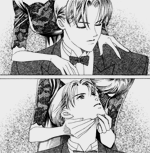In the Eye of the Beholder
The Last Bastion of Freedom
The careful introduction of the story’s central device alone would have sufficed to sweep me off my feet. The reason I have been unable to shake off the pilot, however, is its protagonist’s inner journey through the events of the story.
Kevin thinks critically along with the reader as he is confronted with a technology beyond his wildest imagination, and at every turn, he questions it while reinforcing his own boundaries. There is a physical and emotional distance between his private life — that is to say, his family life and his private thoughts — and the job he applies his skills to. At no point in the story does he make any move to bond with the investigation team, nor say anything to identify with the task he has been requested to take part in. In fact, as with the technology itself, his relationship to the team can be described as strained as he is forced to swallow his ethical concerns and do as ordered in the interests of the nation.
What makes Kevin an intriguing protagonist to me is that he walks (a large) part of the way with the reader, but ultimately possesses something entirely his own — a “sanctuary” that the reader can only begin to grasp, but not take part in, much less claim as their own. He keeps his cards close to his chest, his own secrets so tightly guarded that it takes multiple private scenes before the reader finally understands what they have actually been alluding to. In the end, what makes the pilot’s execution seamless is the parallel development of three elements: the investigation, the implications of the technology’s impact, and Kevin’s stance to privacy in relation to his own truths. And as more details of the case surface, so do more of Kevin’s feelings.
1. Conditions of a Secret
Shortly after the start of the investigation, the findings regarding the circumstances of the president’s death are leaked to the media — despite the confidentiality agreements signed and the threat of legal sanctions. The matter of the ripped-up piece of paper becomes a national mystery. Visibly shaken by the sight of this strictly confidential case on television, Kevin thinks to himself:
A secret is bound to get out. The moment you utter it or write it down, the secret ceases to be a secret. If you really wish to keep a secret until the very end, only dying silently will do.
At this point in the story, it is an unshakable truth in Kevin’s world view that keeping a secret entirely to yourself, never speaking of it, is the only way to eliminate the risk of a secret to be leaked.
As the investigation team goes further back in Reed’s memory, Kevin halts his translation at one point to ask whether it is justified to go that far to solve the case. In protesting against not just viewing, but also translating scenes that happen between spouses even in intimate spaces, he is the sole person in the pilot to voice privacy concerns. Though he continues his work when his concerns are met with silence, his disdain persists just as silently.
2. A Sacred Realm, Mine Alone
Throughout the story, glimpses of Kevin’s private life with his single mother alternate with his days at work. At first, those fleeting instances seem to serve the sole purpose of showing us the investigation leaks on television. They are accompanied by everyday interactions; between the banter and the blunt words, it is evident that Kevin and his mother are on good and equal terms.

The one inscrutable scene occurs when Kevin, intent on pursuing an argument, walks into his mother’s room as she is undressing. There is a moment of non-comical utter silence before he walks out and slams the door shut, leaving her just as puzzled as the reader.
During a break from work, Kevin overhears team members comment on the president’s rigid schedule and dedication to duty. Though Reed looked at the people around him with kind eyes, colouring his very perception of them, his controlled and irreproachable conduct even around family and even when by himself, in the absence of an audience, is perceived as too perfect, robot-like, without feeling. This is all the more baffling as the images of the MRI scanner of all things, which shows a person’s line of vision and the object of their attention, cannot reveal any “stain” on Reed’s character, not a single instance of him letting himself go. One person goes as far as remarking in crass terms — “You could violate a woman with your eyes and no one would be the wiser.” — that even if acting on your desires is forbidden, your one freedom is to use your eyes to look. As the conversation shows, looking is an act so natural that it is not the act, but its absence that strikes the average person as odd, if not inhuman.


When Kevin comes home late the night he overhears the conversation above, he finds his mother, back from a date, passed out on the floor, still dressed up. His attempts to wake her unsuccessful, his gaze lingers on her this time — tender, rueful, and full of longing. In the dead of night, with no audience to witness, this is the moment Kevin finally shows his feelings. And even then, “showing” only extends to looking, and allowing his thoughts to take shape:
Perhaps this is something sinful. My mind is full of images of her. If someone were to look into my mind, they would be surprised at the sheer number. Expressions shown only to me… A woman belonging only to me…
But nobody will ever see them, nor will anybody become aware of them. Even if I get married one day, and have children… When I die, these images and this longing will disappear from this world along with my body.
Nobody can keep you from using your eyes to look and your heart to feel. No matter how much science or civilization advances, nobody can condemn that. This is the one sacred domain of freedom. What you look at and what you think is a sacred realm that belongs only to you.
This is it. This is Kevin’s secret that he has kept from any audience, including the reader, up until this point. And despite everything that he has seen in the course of the investigation — MRI scanner, leaks, the media, intrusive new technology be damned —, one belief still holds true, more than ever: In the absence of words and actions, what is seen through your eyes and what you think are yours alone.
3. The Mind’s Eye
The story hits its climax when investigators have managed to restore and identify what the president had so desperately tried to hide from the world: a photograph of Matthew Harvey, his daughter’s new boyfriend — also known as Ross Macaulay, head of an Austrian anti-government arms group, and reportedly an assassin wanted by the FBI. Under the alias of Matthew Harvey, Macaulay had become emotionally entangled with Deborah for unknown purposes. In search of more leads, the investigation team rewinds Reed’s visual memory to the day of the banquet.
What makes the ensuing scene so striking and unforgettable is a sequence of about 13 pages almost entirely void of words. 13 pages during which the entire team can only look on in absolute silence, spellbound. Even Kevin is rendered speechless, his translation coming to halt as no more words are necessary. The subject of those pages is Macaulay, frame by frame, every blink of the eye, every gesture, every tender moment with Deborah, every single movement as Reed’s eyes follow him through the banquet. Time itself seems to slow down as spectators and reader watch on.










It is a masterful sequence true to Shimizu’s artistry, and fully deserving of the space it occupies (over 1/6th of the pages! — an enormous amount, considering the page restriction of a oneshot). To convey just how intensely beautiful Macaulay looked specifically from Reed’s subjective perspective, Shimizu uses a different technique when their eyes first meet: In that instant, Macaulay is drawn with more detail and more black in the shading, an effect that makes his piercing gaze almost leap out of the page, and the man himself come to life.
The reason for the stunned and pervasive silence is perfectly clear: After having seen so many intimate details of Reed’s private life over the course of the investigation, without stumbling upon anything coming close to a “stain” on his integrity, not a single person on the team was prepared to witness a display of such deep intimacy, much less in public space, and especially not from someone who has been perceived as controlled and unfeeling throughout. The Macaulay sequence is the only instance in which Reed showed such strong emotions. Not in words or actions, not even in facial expressions — solely by looking, strictly in his mind’s eye.
In tearing up the photograph, Reed gave his life to protect this secret, something that was his and his alone. And yet, something so deeply private has been exposed to a group of investigators, and will inevitably make its way to the public. The secret is no longer a secret.
4. Farewell, Beloved Sanctuary
The story ends, fittingly, somewhat abruptly. As expected, the media divulges all of the details to the public, abound with speculations regarding the nature of the relationship between Reed and Macaulay, and Macaulay’s whereabouts, who has vanished without trace. Amidst all the buzz, Kevin bids farewell to his home and mother to embark on a journey of unknown destination. To his mother’s inquiry whether he would return at the end of his trip, he responds with a melancholic expression and a lie.

I can’t come back. I won’t look at this woman anymore. I can’t look anymore. If the act of looking will violate my sacred domain, I’d rather never look again. That’s how much I love her.
As he waves and turns his back, the panels cut to Macaulay’s photograph in the newspaper on the ground, drenched by the rain, and to the ocean that holds the scattered pieces of the original.
While the Macaulay sequence is the most visually impressive element in the story, it is those last two pages of silent, unvoiced “I love you”s that haunt me. That abruptness of the ending and of Kevin’s departure juxtaposed against the steady stirring of the rain and the ocean waves define the conclusion of the story: silent, steady, genuine feelings suddenly jolted awake and forced to take on new shape, even if it means being washed away, forever silenced.
Considering the series’ genre and the case at hand, the pilot is surprisingly quiet. The reader, along with Kevin, firmly remains in the spectator’s seat throughout as the recordings play. The only actions happen “off-screen” whenever the media leaks intimate details to the public. In a story that is so much about visual elements — eyes, perspective, visual memory, the act of looking, the invisible, the public as a constant spectator —, Kevin looks on passively, even as his thoughts are very much alive. It is only at the end of the story that Kevin takes action, and when he does, it is to exit that story, a feat achieved by averting his gaze, ceasing the act of looking.
The motive behind Kevin’s sudden decision strikes me as ambiguous. Did he get spooked and decide to flee, or did he finally confront reality and decide on the course of action he thinks best? Is he moving away to let go of these feelings he has kept to himself for so long, hoping for them to change and focus on something new so that no one will ever discover them? Or is he distancing himself so he can hold on to them, without any proof, not even his gaze, to betray him? Is it the risk of exposure that he fears, or is it the act of looking itself that he can no longer condone? And: Is any of this mutually exclusive?
Part of Kevin’s story is that of an average person making the acquaintance of a new intrusive piece of technology. While foreign to him at first, bit by bit, he has to come to terms with living in a reality where it does indeed exist. Yet, however big its potential and threat, Kevin holds firm to the belief that there are impenetrable areas of privacy — that there are ways to guard these secrets against intrusions, and that there are freedoms inextricably linked to the human existence. What’s more, though outside of anyone’s control, it is highly unlikely that Kevin’s — any individual’s — brain will come into touch with the MRI scanner in the near future, lest they become part of a major crime. Kevin could not have been spooked solely by the possibility that the contents of his brain might be seen, in the sense of a breach of privacy. So, what happened during that Macaulay sequence?
Kevin had previously thought that just looking and feeling were untraceable, and, in a sense, without harm. But then he works on the Reed case, which is an extreme in three ways. Firstly, it is a mirror (yet another visual element) of his own feelings: Like Reed, he feels something very deeply, but does not let it show, and has no intention of ever acting on it. Secondly, Reed’s virtue exceeds that of the average person tenfold. He was a man without reproach, the integrity of his thoughts certified even when by himself, as investigations can attest. Thirdly, though a person of public interest, Reed’s secret was arguably as well-protected as a secret can be (so one would assume). No emotion at any moment betrayed Reed’s face, confidentiality agreements were signed, the breach of which was threatened with long imprisonment, and Reed gave his very life to protect his secret. If, despite all of this, the secret still ends up getting leaked, and Reed’s integrity questioned, what is an average person like Kevin to do?
Perhaps seeing Reed’s emotions, a mirror to his own, in the open made those emotions tangible. They took on shape— no, already had shape, in Reed’s mind, even before the MRI scanner projected them. The eye, however unmoving the expression, is carrier and witness of those emotions. Looking at Macaulay through Reed’s eyes was not only a violation of Reed’s privacy. To Kevin, that act of looking (through someone else’s eyes) must have constituted as a violation of Macaulay himself, just as his team member had put it: Through Reed’s eyes, through Reed’s mind that is exposed to the public, Macaulay turns into a public object of desire. When Kevin is left trembling and speechless during the sequence, it is not solely due to being witness of such deeply intimate feelings, but also of being witness of his own reaction. Perhaps, what he felt, among many different emotions, were empathy and shame. Not the shame of feeling, but the shame of having violated something or someone, having expressed a hidden desire in a tangible form — through the act of looking.
The end of the story is where looking and feeling, previously thought of as the same, as undetectable and thus impervious, are separated: In a world where the MRI scanner sees use, looking amounts to the same as uttering a secret, as acting; looking becomes accessible proof of feeling. Even if nobody ever peers into Kevin’s brain, he now lives in the knowledge of what looking looks like from a third perspective.
In the end, there is no clear answer to the question of Kevin’s motive. Kevin may not have a clear answer. Neither are the above-named motives necessarily mutually exclusive. One thing, however, is certain: His is a decision made out of love; he does what he does to protect what is, at present, dearest to him. The expensive watch that he never wore throughout the story and did not permit his mother to touch, yet relinquishes by the end is perhaps meant as symbolic proof of that: He lets go of it just as he lets go of her — his two treasures he considered too precious to be touched. The watch he gifts his mother with, while his mother is accepting someone’s hand in marriage. Kevin exits the story to remove himself from the picture, granting them freedom from his gaze.